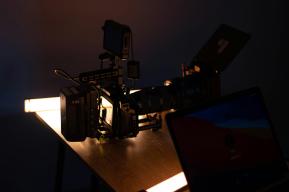Idea
Carolina Musa, a passion for publishing

Carolina Musa
Managing Director of Libros Silvestres
As soon as I could read, words fascinated me. I wrote my first poem at the age of ten and haven't stopped writing since. The idea of setting up a publishing company first came to me as a way to publish my own books. I was running writing workshops for children and making wooden puppets, when I discovered the pop-up book technique. It changed my life, allowing me to combine several of my passions.
I realized that animation made words appear. So, I tried my hand at making three-dimensional books using shapes designed by my friend Laura Oriato. That's how the first two Libros Silvestres titles came about – Caserío [The Hamlet] in 2014, and Cabeza de flor [Corolla], in 2015. We printed 50 copies, assembling them by hand, page by page. They were so successful that we decided to expand our production.
Ten years after it was founded, our publishing house still exists, in Rosario, some 300 kilometres north-west of Buenos Aires, with a catalogue of 56 titles. I publish fiction and literature, mainly for children. I like illustrated books and I've always been sorry that books for adults don't have pictures because images introduce other levels of reading.
I also have a taste for book-objects that open in unusual ways, offer interactive journeys, play with volumes and animations, and can be read upside down... I’m having fun developing these ideas in the Una Cosa maravillosa [A Marvellous Thing] collection. More than 20,000 copies have been printed of the cut-out book Fábrica de escalofríos [The Thrill Factory], which can be used to create ten million poems.
Imagining possible books
Another example is the ¿Qué es? ¿Dónde está? [Who is it? Where is it?] series, which offers Cien cosas para buscar y encontrar [One hundred things to look for and find] in a small format with origami folds. There's also another category of books that I call “literary artefacts”, which aren't books in the strict sense of the term, but which nonetheless take you on a literary adventure, such as Los cuentos de Juanito Conejo [The Tales of Jeannot Lapin], a pack of story cards and other game formats.
I'm lucky to be able to publish only what I'm passionate about
I'm lucky to be able to publish only what I'm passionate about, in other words, texts that touch my heart. When I read a text, I have to imagine the book. For me, that's the primary function of a publisher – to imagine what the book could be. I spend hours looking at illustrations, reviewing the work of visual artists, until I find the one who can take the book in a certain direction.
I also sometimes greatly admire an artist and then wait – actively, attentively and watchfully – for the text that matches his or her visual universe. Publishing also means doing justice to worthwhile texts and talented authors, like Daniel Moyano, Nancy Bacelo and Luisa Futoransky, who are in our catalogue, by building bridges with new generations.
Paper shortage
So much for the dream. The reality is more down-to-earth. Maintaining an annual publication schedule in Argentina is a constant challenge. The economic crisis and inflation are causing the price of raw materials, and therefore printing costs, to rise continuously. Argentina does not produce enough paper for the local industry and cannot afford to import it, resulting in a shortage of this key resource. And the high demand puts pressure on printing costs. In this context, it becomes hard not to give in to certain editorial and aesthetic choices.
Maintaining an annual publication schedule in Argentina is a constant challenge
This rise in costs is also reflected in the price of our books, which is very high. This presents us, as publishers, with a real test of conscience. Are we just publishing for an elite? Isn't that contrary to the emancipatory vocation of books? From my point of view, the great challenge for publishers in Argentina, and perhaps in the South in general, is to be able to develop projects while reinventing forms of production and distribution.
Doing a lot with a little
With this in mind, we have sought to redefine our links with printers, for example by forging partnerships with print shops to cushion production costs. We also have our own graphics studio where we do much of the assembly and binding work. As we only have small print runs – usually 500 copies – this gives us greater flexibility and allows us to reprint the best-selling titles.
Another strategy is to “pre-sell” our publications – at a substantial discount – to loyal readers. We also have our own sales outlets within a network of small and medium-sized independent bookshops, which select their stocks carefully. We also offer activities in schools, local libraries and writing workshops, to forge links between authors and readers.
And, of course, we take part in book fairs all over the country, and we set up specific projects with national and foreign institutions. To recoup our initial investment, we have to organise an event when each book is released.
They say that every crisis is an opportunity, because it forces you to do a lot with little or almost nothing. In any case, whatever the obstacles to be overcome, I can't see myself living in a world where I don't make books, read books and share the passion they inspire.






